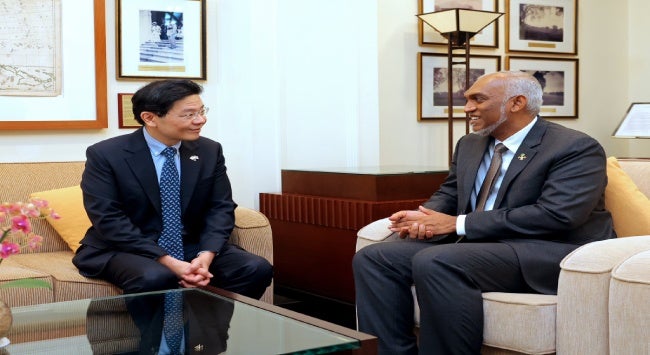Summary
This year marks 50 years on diplomatic ties between the Maldives and Singapore. During the recent visit of Maldivian President Mohamed Muizzu to Singapore, the two countries signed agreements to boost cooperation in various sectors. They also expressed concerns over the impact of climate change, particularly on small countries line the Maldives and Singapore.
As a small strategically located island country in South Asia, the Maldives often finds a leading space in international media for two notable reasons – election of a ‘pro-India’ or ‘pro-China’ leader or policy shift favouring one or the other Asian giant, and as an example of a country facing an existential threat due to the impact of climate change. Politically, due to the dense shadow of India and China over the South Asian island country, the Maldives’ ties with many other countries remain less acknowledged. The Maldives has good ties with several countries. These include the United States, Japan, Australia, Saudi Arabia and Turkey, to name a few.
In Southeast Asia, the Maldives has cordial relations with Singapore. They complete 50 years of diplomatic ties this year. During this period, there have been several notable developments. In 1984, Singapore Airlines became one of the first to start direct flights to and from Malé. The regular flights have enabled Singapore companies such as Banyan Tree and Hotel Properties establish themselves in the Maldives. It also helped tourism flow from Singapore to the Maldives. During the Maldives’ then President Ibrahim Mohamed Solih’s visit to Singapore in 2019, the two countries signed an Open Skies Agreement to enhance air connectivity to “facilitate greater commercial, tourism and people-to-people linkages.”
Tourism contributes around 21 per cent to the Maldives’ gross domestic product and earns more than 60 per cent of its foreign exchange. Despite promotional efforts, tourist number have remained less than significant, including from Singapore. In May 2025, only 977 tourists visited the Maldives from Singapore. One possible reason is that both countries share a similar physical environment, which may reduce the appeal of the Maldives for Singaporean travellers. Additionally, the absence of diplomatic representation by Singapore in the Maldives could deter potential visitors, as it may limit the government’s ability to provide consular assistance during emergencies.
To commemorate the 50th anniversary of their diplomatic ties and further strengthen their relations, the President of the Maldives, Mohamed Muizzu, was in Singapore from 30 June to 2 July 2025. During his visit, Muizzu called on by Singapore’s President Tharman Shanmugaratnam, followed by a meeting with Prime Minister Lawrence Wong. This was Muizzu’s first visit to Singapore as the Maldives’ President, and the fifth high-level visit by a Maldivian leader.
Muizzu and Wong discussed opportunities to strengthen economic cooperation, including ongoing efforts to conclude a Bilateral Investment Treaty. They witnessed the signing of three memoranda of understanding in the areas of cooperation in capacity building, sustainability and environment, as well as higher and vocational education.
During his visit, Muizzu also attended a meeting of the Maldives-Singapore Business Forum. Key investment opportunities in the Maldives, including in clean energy, luxury tourism, infrastructure development and in the digital economy which align with the government’s Vision 2040 to attain developed country status by 2040, were outlined during the event. At the same time, a services agreement to establish a Residence by Investment Programme was signed between the Maldives government and Henley & Partners. The agreement enables investment in the real estate sector in the Maldives. The Maldives government also signed an agreement with Asia Pacific Market Special Purpose Vehicle Private Limited on investment in the Project Solar City. Under this agreement, the Maldives will see the building of the first large-scale floating solar power project. This agreement is in line with the Maldivian government’s target of meeting 33 per cent of the country’s electricity demand through renewable sources by 2028.
Speaking at a state banquet hosted by Singapore’s President, Muizzu expressed a desire to follow the Singaporean way of development to transform his country. He said “The Maldives looks to Singapore as an example for its advancements, and it is important that we move forward together in ways that benefit the future of both countries”. He also acknowledged and expressed gratitude to Singapore for support to the Maldives during critical times, including the 2014 water crisis in Malé, post-tsunami recovery efforts and assistance in the construction of Ghazi School.
During their meeting, Muizzu and Wong also exchanged views on the shared challenges of climate change and its impact on small island states like Singapore and the Maldives. While addressing the impact of climate change is a big issue for the Maldives, its economy remains highly dependent on the blue economy. Both Singapore and the Maldives acknowledged such development paradox but also “noted areas of existing and potential collaboration, such as infrastructure development, master planning, renewable energy, water and waste management, education and tourism”. During the state banquet, Shanmugaratnam also reflected on the impact of climate change on Singapore and the Maldives. He said, “Rising seas, increased warming and extreme weather, and increasingly fragile natural ecosystems pose a fundamental threat to all nations, but impact small island states in unique ways”.
The 50th anniversary of Maldives–Singapore diplomatic ties highlights a mutually beneficial relationship that often goes under the radar. Muizzu’s recent visit reinforced this partnership, opening up new areas of cooperation in clean energy, education, infrastructure and sustainable development. As small island states facing shared challenges like climate change, both countries have committed to deepening collaboration and building a future-oriented relationship grounded in mutual support.
. . . . .
Dr Amit Ranjan is a Research Fellow at the Institute of South Asian Studies (ISAS), an autonomous research institute at the National University of Singapore (NUS). He can be contacted at isasar@nus.edu.sg. The author bears full responsibility for the facts cited and opinions expressed in this paper.
Pic Credit: X
-
 More From :
More From :
-
 Tags :
Tags :
-
 Download PDF
Download PDF



